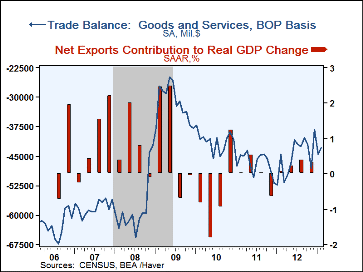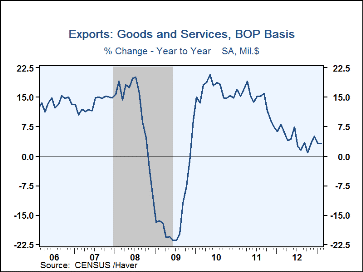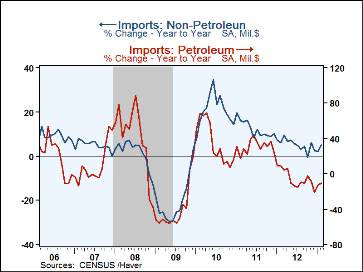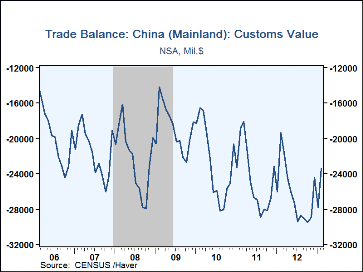 Global| Apr 08 2013
Global| Apr 08 2013U.S. Trade Deficit Improves With Higher Exports
by:Tom Moeller
|in:Economy in Brief
Summary
The U.S. foreign trade deficit during February eased to $43.0 from $44.5B in January, barely revised from $44.4B. A $44.6B deficit had been expected. The m/m deficit improvement owed to a 0.8% gain (3.2% y/y) in exports while imports [...]
The U.S. foreign trade deficit during February eased to $43.0 from $44.5B in January, barely revised from $44.4B. A $44.6B deficit had been expected. The m/m deficit improvement owed to a 0.8% gain (3.2% y/y) in exports while imports were unchanged (1.9% y/y). In chained 2005 dollars, the deficit in goods improved slightly to $44.4B but was barely changed from $44.9B twelve months ago. Real exports inched up 0.2% (2.2% y/y) while real imports slipped 0.3% (+3.2% y/y).
Real merchandise exports ticked up 0.2% (2.2% y/y) as industrial supplies, mostly petroleum products, recovered 2.9% (4.7% y/y). The constant dollar value of motor vehicle exports again rose 1.2% (1.5% y/y). Real exports of foods, feeds and beverages declined 2.6% (+2.8% y/y) while real exports of nonauto consumer goods exports fell 1.9% (+2.2% y/y). Real capital goods exports declined 2.0% (-0.5% y/y). Services exports notched up 0.4% (3.5% y/y). Travel exports gained 0.8% (5.2% y/y) as the dollar's low value prompted more visits to the U.S. from abroad.
The constant dollar value of U.S. imports fell 0.3% (+3.2% y/y) as the real in the value of petroleum imports fell 5.5% (-4.0% y/y). The quantity of petroleum product imports was off 20.1% m/m and was down 8.0% y/y. The price of crude oil improved m/m to $95.96 from $94.08 but was down from $103.63 one year earlier. Real imports less petroleum gained 0.8% in February (4.8% y/y). Real auto imports jumped 4.6% (-0.6% y/y) while real consumer goods excluding autos increased 1.5% (12.1% y/y). The constant dollar value of capital goods imports rose 0.7% (4.4% y/y) and real imports of foods, feeds & beverages gained 0.3% (6.8% y/y). Nominal services imports gained 0.6% (0.2% y/y) as travel imports increased 0.9% (-3.2% y/y).
By country, the February trade deficit in goods with mainland China improved month-to-month but deepened y/y to $23.4B. Exports to China rose 6.4% y/y while U.S. imports increased 16.3% y/y. With Japan, the deficit was roughly stable m/m yet improved y/y to $5.9B. U.S. exports fell 8.0% y/y but imports declined a greater 12.0% y/y. The deficit with the European Union was roughly unchanged m/m at $8.8B and compared to $5.9B twelve months earlier. U.S. exports fell 10.9% y/y but imports increased 1.3% y/y.
The international trade data can be found in Haver's USECON database. Detailed figures are available in the USINT database. The expectations figures are from the Action Economics consensus survey, which is carried in the AS1REPNA.
Communication in Monetary Policy is last week's speech by Federal Reserve Vice Chair Janet L. Yellen and it is available here.
| Foreign Trade (Current Dollars) | Feb | Jan | Dec | Y/Y | 2012 | 2011 | 2010 |
|---|---|---|---|---|---|---|---|
| U.S. Trade Deficit | $43.0B | $44.5B | $38.1B | $44.6B (2/12) |
$539.5B | $559.9B | $494.7B |
| Exports (%) | 0.8 | -1.2 | 2.2 | 3.2 | 4.3 | 14.2 | 16.7 |
| Imports | 0.0 | 1.8 | -2.6 | 0.9 | 2.7 | 13.9 | 19.4 |
| Petroleum | -5.9 | 12.4 | -11.0 | -10.1 | -5.5 | 30.7 | 32.5 |
| Nonpetroleum goods | 1.0 | -0.0 | -1.4 | 5.0 | 5.2 | 12.1 | 20.8 |
Tom Moeller
AuthorMore in Author Profile »Prior to joining Haver Analytics in 2000, Mr. Moeller worked as the Economist at Chancellor Capital Management from 1985 to 1999. There, he developed comprehensive economic forecasts and interpreted economic data for equity and fixed income portfolio managers. Also at Chancellor, Mr. Moeller worked as an equity analyst and was responsible for researching and rating companies in the economically sensitive automobile and housing industries for investment in Chancellor’s equity portfolio. Prior to joining Chancellor, Mr. Moeller was an Economist at Citibank from 1979 to 1984. He also analyzed pricing behavior in the metals industry for the Council on Wage and Price Stability in Washington, D.C. In 1999, Mr. Moeller received the award for most accurate forecast from the Forecasters' Club of New York. From 1990 to 1992 he was President of the New York Association for Business Economists. Mr. Moeller earned an M.B.A. in Finance from Fordham University, where he graduated in 1987. He holds a Bachelor of Arts in Economics from George Washington University.
More Economy in Brief
 Global| Feb 05 2026
Global| Feb 05 2026Charts of the Week: Balanced Policy, Resilient Data and AI Narratives
by:Andrew Cates










